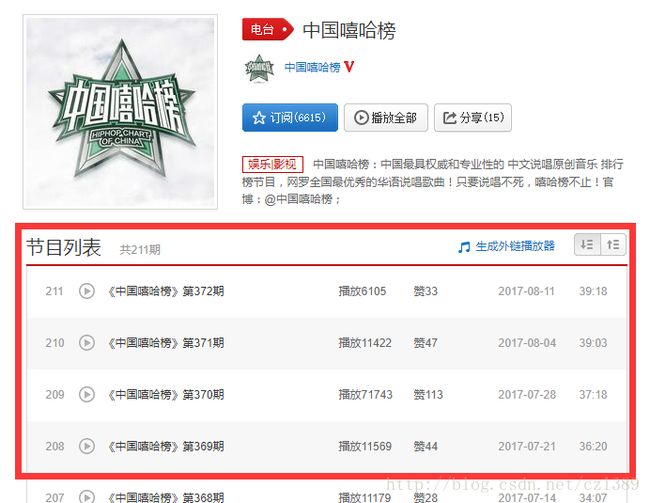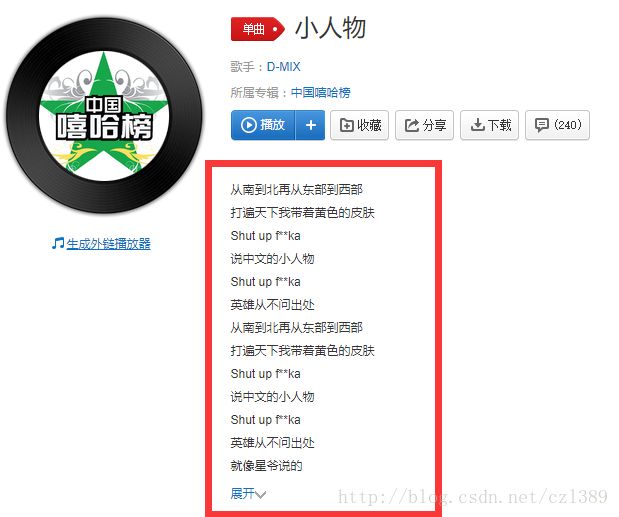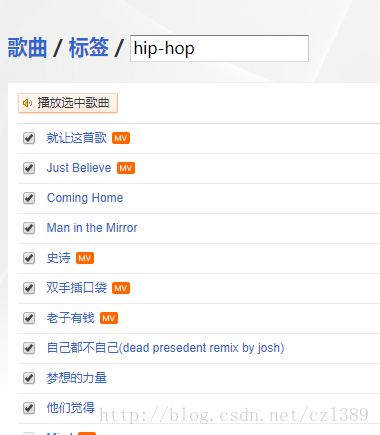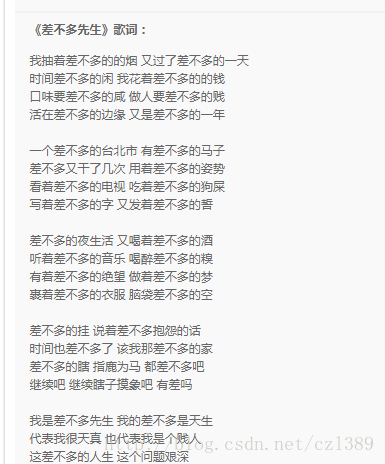中国有嘻哈:网易云、虾米音乐歌词爬虫项目分享
《中国有嘻哈》这款综艺带火了中国的嘻哈音乐,大家问好也都变成了:你有freestyle吗?
相信大家都是因为这篇高大上的微信推送文章来的。
没看到也不要紧,传送带在这里–>爱票子也爱妹子:300万字歌词分析看中国rapper到底在唱什么。
真心觉得寒小阳老师的数据分析技术很厉害~还有小编的文笔也很赞~
我主要负责了数据采集的部分。通俗点就是编写一个爬虫,把大量歌曲歌词爬下来。
点击右侧链接,可访问源码资源:网易云、虾米音乐歌词爬虫源码
确定爬取目标
网易云音乐中国嘻哈榜-主播电台 吸引了我们的注意。这是最贴近《中国有嘻哈》这个热点的。随着综艺的播出,每周都有新的节目歌曲更新。现在已经到372期了。
首先可以看到节目列表。
点击“节目”进入另一个页面:歌曲列表。发现这期节目有10首歌。
点击“歌曲”进入歌曲主页,发现了我们想要的歌词,眼前一亮~
“展开”这个刺眼的js标签让歌词内容部分遮掩。
我们不得不来个selenium模拟鼠标点击,才能得到想要的歌词吗?
其实不必这样,细心的组长早就发现了简单的方法:
取得节目列表下所有歌曲信息
提示:歌词 -> 使用 http://music.163.com/api/song/media?id=421203370(歌曲编号)来取得。
当时电台也已经更新了208期了,如果每期有10首的,将会得到约2000首歌。
后来,将全部数据爬下来才证明是too naive 了。歌曲重复实在是太多,去重之后,发现才368首,368首!
痛定思痛,我们把目光瞄向了虾米音乐。在搜索框中输下”hip-hop”,
回车,我们发现虾米音乐可以搜索特定标签的歌曲,就比如hip-hop。
往后翻页,总共有401页。而且url很有规律,可以直接访问。这个好。
![]()
偷偷估算了一下,401页,每页30首,可以得到1万两千首,amazing!
不过这次,首先爬取了url,并进行筛重。最后,剩余能有五六千首的样子。
它—虾米,歌词的页面。
好了,爬取目标已确定。
编写爬虫
看一下代码。
使用的是scrapy爬虫框架,很灵活很强大。
与正则表达式、beautifulsoup库相比,有很方便的自定义配置和定制。
在这个框架中,工作主要集中在
- items
- spiders
可能还会用到
- pipelines
- middlewares
还有一个配置文件
- settings
网易云音乐爬虫代码
- items.py
# -*- coding: utf-8 -*-
# Define here the models for your scraped items
#
# See documentation in:
# http://doc.scrapy.org/en/latest/topics/items.html
import scrapy
class ProgramItem(scrapy.Item):
# define the fields for your item here like:
# name = scrapy.Field()
program_url=scrapy.Field() #节目链接
issue=scrapy.Field() #期号
create_time=scrapy.Field() #创建时间
play_times=scrapy.Field() #播放次数
subscription_number=scrapy.Field() #订阅次数
like_number=scrapy.Field() #点赞数
comment_number=scrapy.Field() #评论数
share_number=scrapy.Field() #分享数
class SongItem(scrapy.Item):
song_id=scrapy.Field() #歌曲编号
artist_id=scrapy.Field() #歌手编号
album_id=scrapy.Field() #所属专辑编号
comment_number=scrapy.Field() #评论数
title=scrapy.Field() #歌曲名
class LyricItem(scrapy.Item):
song_id=scrapy.Field() #歌曲编号
lyric=scrapy.Field() #歌词- middlewares.py
# -*- coding: utf-8 -*-
# Define here the models for your spider middleware
#
# See documentation in:
# http://doc.scrapy.org/en/latest/topics/spider-middleware.html
from scrapy import signals
from scrapy.http import HtmlResponse
from lxml import etree
import time
from random import choice
from selenium import webdriver
from selenium.webdriver.common.desired_capabilities import DesiredCapabilities
ua_list = [
"Mozilla/5.0 (X11; Linux x86_64) AppleWebKit/537.36 (KHTML, like Gecko) Ubuntu Chromium/48.0.2564.82 Chrome/48.0.2564.82 Safari/537.36",
"Mozilla/5.0 (Windows NT 6.1) AppleWebKit/537.36 (KHTML, like Gecko) Chrome/41.0.2228.0 Safari/537.36",
"Mozilla/5.0 (Windows NT 10.0) AppleWebKit/537.36 (KHTML, like Gecko) Chrome/40.0.2214.93 Safari/537.36",
"Mozilla/5.0 (X11; OpenBSD i386) AppleWebKit/537.36 (KHTML, like Gecko) Chrome/36.0.1985.125 Safari/537.36",
"Mozilla/5.0 (Macintosh; Intel Mac OS X 10_9_0) AppleWebKit/537.36 (KHTML, like Gecko) Chrome/32.0.1664.3 Safari/537.36"
]
dcap = dict(DesiredCapabilities.PHANTOMJS)
dcap["phantomjs.page.settings.resourceTimeout"] = 15
dcap["phantomjs.page.settings.loadImages"] = False
dcap["phantomjs.page.settings.userAgent"] = choice(ua_list)
class Music163XihaSpiderMiddleware(object):
# Not all methods need to be defined. If a method is not defined,
# scrapy acts as if the spider middleware does not modify the
# passed objects.
sleep_seconds = 0.2 # 模拟点击后休眠3秒,给出浏览器取得响应内容的时间
default_sleep_seconds = 1 # 无动作请求休眠的时间
def process_request(self, request, spider):
spider.logger.info('--------Spider request processed: %s' % spider.name)
page = None
if 'djradio' in request.url or 'program' in request.url or 'song?id=' in request.url:
driver = webdriver.PhantomJS()
spider.logger.info('--------request.url: %s' % request.url)
driver.get(request.url)
driver.implicitly_wait(1)
# 仅休眠数秒加载页面后返回内容
time.sleep(self.sleep_seconds)
driver.switch_to.frame(driver.find_element_by_name("contentFrame")) # 取得框架内容
page = driver.page_source
driver.close()
elif 'media' in request.url:
driver = webdriver.PhantomJS()
spider.logger.info('--------request.url: %s' % request.url)
driver.get(request.url)
driver.implicitly_wait(0.2)
# 仅休眠数秒加载页面后返回内容
time.sleep(self.sleep_seconds)
page = driver.page_source
driver.close()
return HtmlResponse(request.url, body=page, encoding='utf-8', request=request)- spiders.py
#-*- coding: utf-8 -*-
import scrapy
import os, json, codecs
from hashlib import md5
from faker import Factory
from music163xiha.items import LyricItem
f = Factory.create()
'''
取得节目列表下所有歌曲信息
提示:歌词 -> 使用 http://music.163.com/api/song/media?id=421203370(歌曲编号)来取得
cd /home/andy/000_music163xiha/scrapy/music163xiha/spiders
pyenv activate scrapy2.7
scrapy crawl songs
'''
class LyricsSpider(scrapy.Spider):
lyric_url = 'http://music.163.com/api/song/media?id='
song_list_file='./result/song_url.txt'
name = "lyrics"
allowed_domains = ["music.163.com"]
def __init__(self, *args, **kwargs):
#从上一步骤取得的 song_list 文件中读取得到所有 url
f = open(self.song_list_file,"r")
lines = f.readlines()
if len(lines)==0:
self.log('*************\nPlease run spider \'programs\' first\nto get program_url.txt\n****************')
print '************'
print len(lines)
print '************'
song_id_list=[line.split('=')[1] for line in lines]
song_list=[self.lyric_url+song_id for song_id in song_id_list]
f.close()
print '************'
print song_list[0]
print '************'
self.start_urls = song_list # 此处应从上一步骤取得的 program_list 文件中读取得到所有 url
def parse(self, response):
self.log('--> url:%s' % response.url)
result = response.xpath('//body/text()').extract_first()
json_result = json.loads(result, encoding='utf-8')
#self.log('--> lyric:%s' % json_result['lyric'])
lyric_text=json_result['lyric']#歌词
lyric=LyricItem()
lyric['lyric']=lyric_text
lyric['song_id']=response.url.split('=')[1][:-3]#因为‘=’后面的id后面莫名其妙的跟着3个字母%0A,遂去掉,加[:-3]
yield lyric虾米音乐爬虫代码
- items.py
# -*- coding: utf-8 -*-
# Define here the models for your scraped items
#
# See documentation in:
# http://doc.scrapy.org/en/latest/topics/items.html
import scrapy
class SongUrlItem(scrapy.Item):
# define the fields for your item here like:
# name = scrapy.Field()
song_url=scrapy.Field() #歌曲链接
class LyricItem(scrapy.Item):
# define the fields for your item here like:
# name = scrapy.Field()
lyric=scrapy.Field() #歌曲链接
song_url=scrapy.Field() #歌曲链接
class SongInfoItem(scrapy.Item):
# define the fields for your item here like:
# name = scrapy.Field()
song_url=scrapy.Field() #歌曲链接
song_title=scrapy.Field() #歌名
album=scrapy.Field() #专辑
#singer=scrapy.Field() #歌手
language=scrapy.Field() #语种- spider.py
# -*- coding: utf-8 -*-
import scrapy
from xiami.items import LyricItem
class LyricsSpider(scrapy.Spider):
name='Lyrics'
allowed_domains=['xiami.com']
song_url_file='./result/song_url.csv'
def __init__(self, *args, **kwargs):
#从song_url.csv 文件中读取得到所有歌曲url
f = open(self.song_url_file,"r")
lines = f.readlines()
#这里line[:-1]的含义是每行末尾都是一个换行符,要去掉
#这里in lines[1:]的含义是csv第一行是字段名称,要去掉
song_url_list=[line[:-1] for line in lines[1:]]
f.close()
self.start_urls = song_url_list#[:100]#删除[:100]之后爬取全部数据
def parse(self,response):
lyric_lines=response.xpath('//*[@id="lrc"]/div[1]/text()').extract()
lyric=''
for lyric_line in lyric_lines:
lyric+=lyric_line
#print lyric
lyricItem=LyricItem()
lyricItem['lyric']=lyric
lyricItem['song_url']=response.url
yield lyricItem完整代码稍后会更新到我的github。
遇到的困难和问题解决
- 爬虫访问太快,被服务器拒绝访问
可以在settings.py设置:
DOWNLOAD_DELAY = 1还有其它防止被拒绝访问的措施:
设置用户代理
from faker import Factory
f = Factory.create()
USER_AGENT = f.user_agent()
设置请求头
# Override the default request headers:
DEFAULT_REQUEST_HEADERS = {
'Host': 'www.xiami.com',
'Accept': '*/*',
'Accept-Encoding': 'gzip, deflate, br',
'Accept-Language': 'zh-CN,zh;q=0.8',
'Cache-Control': 'no-cache',
'Connection': 'Keep-Alive',
}- xpath爬不到
比如Chrome浏览器会对一些html源码进行规范。有的时候右键“检查”得到的xpath路径是错误的。比如tbody这个标签。
- 网易云音乐有些页面使用了一种叫做iframe 的结构。
抓取其中内容需要,在中间件中做一些工作。
def process_request(self, request, spider):
spider.logger.info('--------Spider request processed: %s' % spider.name)
page = None
if 'djradio' in request.url or 'program' in request.url or 'song?id=' in request.url:
driver = webdriver.PhantomJS()
spider.logger.info('--------request.url: %s' % request.url)
driver.get(request.url)
driver.implicitly_wait(1)
# 仅休眠数秒加载页面后返回内容
time.sleep(self.sleep_seconds)
driver.switch_to.frame(driver.find_element_by_name("contentFrame")) # 取得框架内容
page = driver.page_source
driver.close()
elif 'media' in request.url:
driver = webdriver.PhantomJS()
spider.logger.info('--------request.url: %s' % request.url)
driver.get(request.url)
driver.implicitly_wait(0.2)
# 仅休眠数秒加载页面后返回内容
time.sleep(self.sleep_seconds)
page = driver.page_source
driver.close()
return HtmlResponse(request.url, body=page, encoding='utf-8', request=request)






